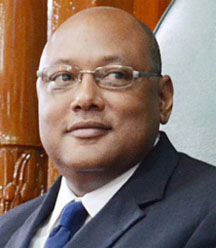The disclosure just over two years ago that significant deposits of oil had been found offshore Guyana created some discernible changes in public behaviour that had to do with what we anticipated would be a qualitative transformation which the advent of oil would bring to Guyana. In order to keep the populace up to date with the significance of the oil find the media in Guyana have had to learn quickly and even now we are still nowhere close to understanding all of the ramifications of the sector as it pertains, first, to regulations associated with oil exploitation and secondly to the broader ramifications of the relationship between the Government of Guyana and Exxon-Mobil. Arguably, the biggest issue has to do with how our oil and gas resources would impact on the development of the country, as a whole, in terms of raising poverty eradication, raising the standard of living and upgrading the critical elements of the country’s infrastructure in the areas of education, health, science and technology, agriculture transportation et al.
Setting aside news associated with both the domestic and international implications of preparing for the commencement of the oil recovery process in 2020 there is also a different type of anticipation associated with notions, frequently fanciful ones, of untold wealth attendant and transformation towards a good life for all. These notions have been embellished with further announcements of additional oil finds.

There is a need to ensure that we wisely manage (not suppress but manage) the information flow or we could arrive at a point where we simply string up our hammocks and lie back waiting for the largesse of 2020……and beyond.
The information that has been disseminated regarding oil and oil exploitation has ranged from an interest in just how much employment will be generated for Guyanese from the oil and gas sector as well as the likely environmental effects that could accrue from Guyana becoming a so-called oil-producing nation. The discourse has also extended into other interesting areas including considerations of wealth-sharing (between ourselves and our external partners), the setting aside of a Sovereign Wealth Fund and whether or not we will quickly discover that the oil sector is what Natural Resources Minister Raphael Trotman described as a “family and friends’ affair. The “family and friends” affair point was made against the backdrop of the experiences of countries like Nigeria, Angola and Equatorial Guinea, among others, where oil wealth has found its way into the pockets of well-placed public officials and where official undertakings regarding the redirecting of the returns from oil to raising standards of living and targeting the upgrading of poor communities remain largely unfulfilled.
To dwell on this particular issue momentarily – and rather than immerse ourselves in wasteful self-delusion – it would do no harm to concede that there exists a popular belief that persons appropriately positioned are likely to ‘do well’ out of the proceeds of the oil and gas sector. There is really little we can do to quell the notion – rooted in generous precedent – that the temptation to redirect some oil wealth away from those nation-building pursuits to which they ought to be channeled will not occur. What we can do, however, is to be realistic about the likelihood of such an eventuality and focus attention on creating the institutional structures that help protect against such eventualities and help protect the oil and gas sector from the sort of plunder that has been the experience
What is of concern too – and this has been, to some extent, an issue of public discourse – is whether an oil and gas industry will have the effect of ‘turning our heads,’ so to speak, to the extent that other traditionally important sectors of the economy do not simply get left by the wayside. Contextually, the recent announcement by the Minister of Natural Resources that even as the oil discourse ensues we are, as well, ‘talking up’ the creation of a regime of mining syndicates, is an encouraging sign. Syndicates, if they work well, will have the effect of generating the kind of direct employment for locals that will not occur in the oil and gas sector. The owners of syndicates will effectively be business owners. In the oil and gas sector, a relatively small number of Guyanese will benefit from direct employment whilst others will become service-providers in ways that will, in effect, make them business owners.
The oil industry and its implications for multi-faceted transformation in Guyana is simply too much to internalize in one fell swoop. Understanding the sector, particularly for ordinary citizens is only likely to grow out of the practical experiences that we encounter as the sector unfolds and as occurrences that enhance our understanding of the complex realities of the sector unfold. One imagines too that there will develop here, over time, a formal body of knowledge on the oil and gas industry driven by the efforts of interest groups that include both state and private sector interest groups as well as the intellectual contributions that are likely to grow out of the efforts of the University of Guyana and other like-minded institutions. All those, cumulatively, will contribute to the development of what one might call our oil and gas education.
And then, of course, there are the lessons of history as reflected in the experiences of other countries some of which have already been referred to in this editorial. By far our biggest responsibility is to ensure, collectively, the prudent use of the resources that accrue from the oil and gas sector, bearing in mind that the recent “family and friends” reference made by the Natural Resources Minister did not derive from some figment of imagination but from living, breathing examples of unconscionable rip-offs by people in power who simply turned the resources of their people and their countries into their own personal fortunes. It would be an act of unpardonable folly simply to assume that such acts of greed and treachery cannot recur here in our country.









